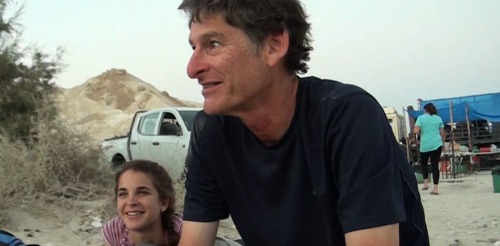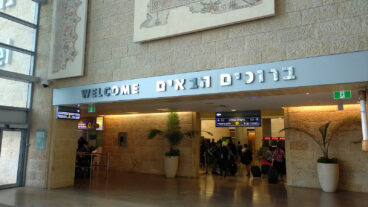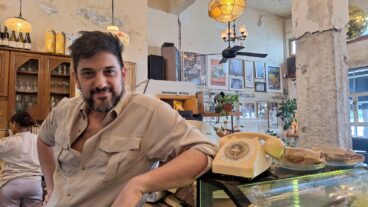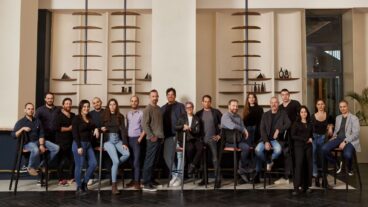Keshet educational tours interface with Israeli society so that visitors understand that the story of contemporary Israel is their story, too.

At the offices of Keshet: The Center for Educational Tourism in Israel in Jerusalem, things are humming with activity. Every summer the organization’s staff of 33 swells three fold, and this July is no exception.
Already 10 busloads of American Jewish high school-age students are exploring Israel with Keshet guides, alongside half a dozen synagogue and church groups from the US, Mexico and Europe.
And work is underway on Start-Up Nation tours, an ambitious new tour program launched this summer, which will be hosted by Keshet in collaboration with Dan Senor and Saul Singer, bestselling authors of Start-Up Nation: The Story of Israel’s Economic Miracle.
The idea is to bring the lessons of the bestselling book to life through visits to high-tech companies, meetings with CEOs and discussions with prominent venture capitalists. Participants will examine the cultural factors and government policies that have positioned Israel as a world leader in innovation and entrepreneurial initiative.
Yitzhak Sokoloff, a Boston-area native, began Keshet 16 years ago to offer inspirational identity-building educational experiences in Israel for Jewish students from across all spectrums of American Jewish affiliations. “We are one of the largest operators in the field,” says the founding director.
Educational experiences all year round
Though summer may be a busy period, it’s an all-year-round business. Keshet provides educational experiences and targeted seminars for diverse synagogue and school groups, Christian organizations and families.
In the spring and fall semesters, Keshet operates youth programs for about 20 schools that send eighth- or 10th-graders to Israel for up to three months. “At least emotionally, the world of youth remains our flagship operation,” says Sokoloff.
As much as it was structured to serve a different kind of client base, Keshet was also structured to attract a different kind of professional.
“It used to be that in informal Jewish education you reached a certain point and could no longer support your family, so you had to do something in ‘real life.’ We wanted to see this work as ‘real life,’ and to make that possible, we had to make it attractive for people to make this their career,” says Sokoloff.
“We redefined the role of guide as educator, and recruited outstanding Jewish educators who had also completed the guide course. Today, Keshet operates tours and seminar-level programs for professional, educated adults whose guides are intellectually at least at the level of those they’re guiding.”
With employees hailing from the United States, Israel, Switzerland, England and Canada, Keshet’s senior staff is a diverse group of talented educators who reflect the richness of Israel life. Keshet’s first academic director was Michael Oren, Israel’s current ambassador to the United States.
“Keshet is in many ways an organization of old friends who share their resources and excitement,” says Sokoloff. “We are rabbis, educators, ambassadors and executives who all allow ourselves to be people’s interface with Israeli society at a deeper level.”
Itinerary: Israel as inspiration
Keshet tourists experience family-to-family hospitality, and meet soldiers, volunteers, relief workers, settlers, farmers, Arab and Jewish youth, members of the Masorti and Progressive movements, Hasidim, urban kibbutzniks and political leaders – the gamut of the Israeli social order.
“Our clients see that Israel is not just a raging political argument, but raging idealism in action,” says Sokoloff.
“We are not portraying Israel as a society in desperate need of help, but as the center of the Jewish people. If anything, the individuals here are concerned about how things are for Jews elsewhere. They are not looking for sympathy, but to show how their lives are meaningful. It’s tremendously inspiring to understand Zionism as personal altruism.”
Keshet’s programs use Israel as a context to explore, and often to confront, central ideas in Judaism and Jewish history.
“Our itineraries are planned with the idea that less is more,” says Sokoloff. “We offer programs that are memorable and moving, even at the expense of ‘checking off all the boxes’ in one trip. Sometimes the younger members of a group will go hiking, while the older ones visit a winery. Our staffing structure includes senior tour educators working alongside youth counselors, and this gives us that flexibility.”
About 140 rabbis partner with the company for their congregational Israel tours from North America and England. Keshet’s German-speaking department operates about two dozen tours every year for Jewish communities from Switzerland and Germany. The company has created tours for Birthright returnees, rabbi-scholars, physicians, fans of the Michael Medved Show (http://www.michaelmedved.com), deaf American Jews and frequent visitors wanting to delve into particular segments of Israeli society, such as the military.
Forging connections with Israelis
Keshet books many Christian groups from Europe and North America. There are plenty of Christian tour operators in Israel, but Sokoloff says many gentile visitors “are very interested in the relationship between Jews and Christians, and they are happy to see Israel through the eyes of committed Jews.”
The Start-Up Nation Tour project headed by Steve Gray, former manager of Intel’s venture capital arm in Israel and a recent graduate of the highly demanding Israeli tour guide program. The idea is to bring the lessons of the bestselling book to life through visits to high-tech companies, meetings with CEOs and discussions with prominent venture capitalists. Participants will examine the cultural factors and government policies that have positioned Israel as a world leader in innovation and entrepreneurial initiative.
“The goal is to bring people to Israel for whom the culture of innovation is a magnet, who want to see it firsthand,” says Sokoloff. “We’re using the book as a model to show how high-tech here is a creation of Israeli society’s creative forces, highlighting the army as the hothouse for many of these ventures.”
Many former clients stay in touch with people they met in Israel through Keshet, and a significant number return for weeks or years.
“The bottom line is that we’ve waited 2,000 years to have our own country, and what kind of society are we creating here? It’s critically important that people understand that the story of contemporary Israel is their story, too.”













